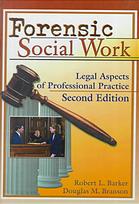

Most ebook files are in PDF format, so you can easily read them using various software such as Foxit Reader or directly on the Google Chrome browser.
Some ebook files are released by publishers in other formats such as .awz, .mobi, .epub, .fb2, etc. You may need to install specific software to read these formats on mobile/PC, such as Calibre.
Please read the tutorial at this link. https://ebooknice.com/page/post?id=faq
We offer FREE conversion to the popular formats you request; however, this may take some time. Therefore, right after payment, please email us, and we will try to provide the service as quickly as possible.
For some exceptional file formats or broken links (if any), please refrain from opening any disputes. Instead, email us first, and we will try to assist within a maximum of 6 hours.
EbookNice Team

Status:
Available4.8
31 reviews
ISBN 10: 1315821575
ISBN 13: 9781315821573
Author: Robert L Barker, Douglas M Branson
The Purpose of Forensic Social Work
Law in the Origins of Social Work
Early Affinity of Social Work and the Law
Divergence Between Social Work and the Law
Growth of the Litigious Society
Social Work’s Renewed Interest
What Social Workers Must Know About the Law
The Emergence of Forensic Social Work
What Do Forensic Social Workers Do?
Motivations for Forensic Social Workers
Payment for Forensic Experts
Positive Incentives
Forensic Social Work as a Part-Time Occupation
Steps Toward a Forensics Specialty
How Expert Witnesses Become Established
Referral-Building Activities
Forensic Marketing Organizations
Forensic Professional Groups
Forensic Experts in Related Fields
National Organization of Forensic Social Workers
Conclusion
Types of Courtroom Witnesses
Roles of the Social Work Fact Witness
Distinguishing Fact and Expert Witnesses
The Subpoena
Presenting Testimony Effectively
Responding to Direct Examination
Responding to Cross-Examination
Hazards in Presenting Testimony
Testifying Against Clients
The Testimony of Children
Recovered or Implanted Memory
Ten Guidelines for the Effective Witness
Pretrial Negotiations
Negotiating Payment
Preparation as an Expert Witness
Rehearsing Expert Testimony
Voir Dire: Qualifying as an Expert
Presenting Expert Testimony
Direct Examination of the Expert
Cross-Examination of Expert Witnesses
Tactics to Impeach Expert Witnesses
Conclusion
Some Malpractice Examples
Responsibility for Therapy Outcomes
Alleged Child Abuse: To Report or Not?
The Ramona Case
Criteria for Malpractice Liability
Preventive and Defensive Practices
Conduct Leading to Malpractice Claims
Malpractice Suits for Incorrect Treatment
Malpractice for Sexual Misconduct
Misuse of Influence
Breach of Confidentiality and Defamation
Faulty Diagnosis or Assessment
Death/Suicide of Client
Failure to Refer to Other Professionals
Premature Termination
Treatment Without Informed Consent
Failure to Warn
The Limits of Confidentiality
Child Abuse and Neglect Laws
“Duty to Warn” Laws
The Tarasoff Case
Implications of the Tarasoff Rulings
Confusion and Contradictions
Rationale of Judges and Legal Officials
Guidelines for Coping
Implementing the Actual Warning
Jaffee vs. Redmond
Implications of Jaffee vs. Redmond
Conclusion
Recognizing a Potential Legal Hazard
The Emotional Risks of Litigation
When to Seek Legal Help
Costs of Litigation
Goals in Hiring a Lawyer
Finding the Right Lawyer
Retaining the Lawyer
Trial or Settlement?
On Trial for Malpractice
Need for Alternatives to Law Courts
Philosophies of Reviewing Organizations
Types of Sanctions
Disciplinary Action Reporting System (DARS)
Third-Party Review Procedures
NASW Peer Review Procedure
Outcomes of NASW Reviews
Critique of NASW Adjudication Procedures
Other Professional Review Procedures
Inevitability of Peer Review
How to Avoid or Minimize Sanctions
When Misconduct Is Acknowledged
Report Writing for the Litigious Society
Record Keeping for Couples and Families
The Problem-Oriented (SOAP) Record
Accessibility of Case Records
Forensics Reports Versus Case Records
The Written Contract
Objectives of the Written Contract
Appearance of Contracts
A Prototype Contract
Presenting the Contract to the Client
Enforceability of the Contract
Why Written Contracts Are Rare
Is Contracting Antipsychosocial?
Influences Toward Contracting
Written Versus Verbal Contracts
The Preservation of Contracts and Records
Conclusion
Practicing Without Credentials
Consequences of Misrepresentation
What Are Credentials?
Credentials by Professional Associations
Credentials by Public Statute
Origins of Social Work Credentials
Requirements for Professional Credentials
The ACSW
The QCSW
The SSWS
The DCSW
ABE’s BCD
The FTPA
The NMCOP
NAP
Other Credentialing Organizations
Social Work Licensure
Functions of the Licensing Board
Licensing Examinations
Comparing Credentials with Other Professions
Unresolved Credentialing Problems
The Grandparent Rule
forensic (criminal justice) social work
forensic social work skills
msw forensic social work
what does forensic social worker do
legal responsibilities of a social worker
Tags: Robert L Barker, Douglas M Branson, Social Work